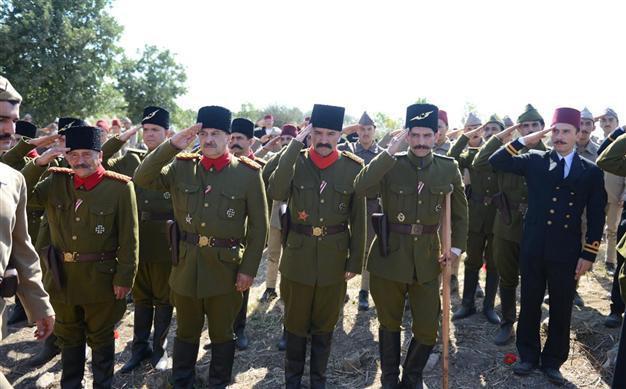Gallipoli Campaign reimagined through films
Emrah Güler

As the centenary of the Gallipoli Campaign, or the Battle of Çanakkale, comes in two days, a new feature film release will mark the anniversary, with many feature films and documentaries getting the royal treatment with DVD releases.
This Wednesday, March 18, will mark the centenary of the Gallipoli Campaign, or the Battle of Çanakkale, one of the most important battles of the 20th century as it shaped modern history and eventually created the dynamics for the national consciousness of many countries, Turkey for one.
The attack of the Allied Forces in World War I against the Ottoman to capture the Dardanelles in 1915, the Çanakkale Strait, would result in a huge defeat for the Allied forces, leading to the death of more than 130,000 Turkish, British, French, Australian, New Zealand and Indian troops in eight months. The campaign would help Turks regain confidence that would eventually kick-start the Turkish Independence War, and the founding of modern Turkey eight years later.
The Gallipoli Campaign has been a major inspiration for filmmakers, with the centenary being a driving force for a couple of years now. One major release is two days away, another international production hit the theaters less than three months ago, many feature films and documentaries are getting the royal treatment with DVD releases, and a few are waiting for their release dates.
On the anniversary of the Gallipoli Campaign, the epic drama “Son Mektup” (Last Letter) will have a nationwide release. The film is written, directed and produced by Özhan Eren, a name familiar from another World War I drama, 2008’s “120” on the 1915 Battle of Sarıkamış, a powerful film that was careful in not praising war.
With generally favorable reviews for “120,” a promising teaser (especially with the battle scenes) for his upcoming “Son Mektup,” as well as increasing nationalist sentiments in Turkey, the film will likely draw crowds to theaters. Tansel Öngel and Nesrin Cavadzade star as the captain pilot and the nurse who fall for each other among the cannons and guns. The two forge a bond while sheltering an orphan boy. The drama is sure to make many weep with the press material noting that the last letter in the title is to be delivered 40 years later.
The good, the bad, and on DVD Russell Crowe’s directorial debut (for a feature film), “The Water Diviner,” made quite the headlines last December in Turkey, where he co-starred with two big names from Turkey, Yılmaz Erdoğan and Cem Yılmaz. Adapted from the book of the same name by Andrew and Meaghan Wilson Anastasios, the film follows Crowe’s Australian farmer traveling to Turkey after the Battle of Gallipoli in search of his three missing sons. Nominated in nine categories in the Australian Academy of Cinema and Television Arts Awards, the film won three awards including best film.
If “The Water Diviner” showed the atrocities of war through the eyes of a father, Turkish filmmaker Sinan Çetin’s “Çanakkale Çocukları” (Children of Gallipoli) of 2012 was an attempt to tell the tolls of war on a mother. The production was a family business with Çetin directing, producing, writing, and credited as the cinematographer, with his wife Rebecca Haas and his two sons starring in the film.
“Can a mother’s cry stop the war?” was the tagline of the film that set Haas’ Australian mother, married to a Turkish man, to take on a journey to save her two sons from killing each other in the Gallipoli trenches. The anti-war message of the film was too blatant, with dialogue often veering toward half-baked lectures.
The same year saw Yeşim Sezgin’s “Çanakkale 1915,” an adaptation of Turkish writer Turgut Özakman’s “Diriliş” (Resurrection). With its nationalist tone, the film glorified the Gallipoli Campaign and its role in the Independence War. Lacking drama and focus, the film (as was the book) played more like an enactment of official history in school books. The hyped epic war scenes were a joke, as were many of the other things in the film.
Among a plethora of dry, uninspired documentaries on the Gallipoli Campaign, one stands out: director and writer Tolga Örnek’s “Gallipoli: The Front Line Experience” of 2005. Narrated by Sam Neill and Jeremy Irons, the documentary uses archival photos, film footage and dramatization. But perhaps the real impact of the film lies in its usage of letters and diaries of 10 soldiers, British, Australian, New Zealand and Turkish, turning it into a strong anti-war statement.
